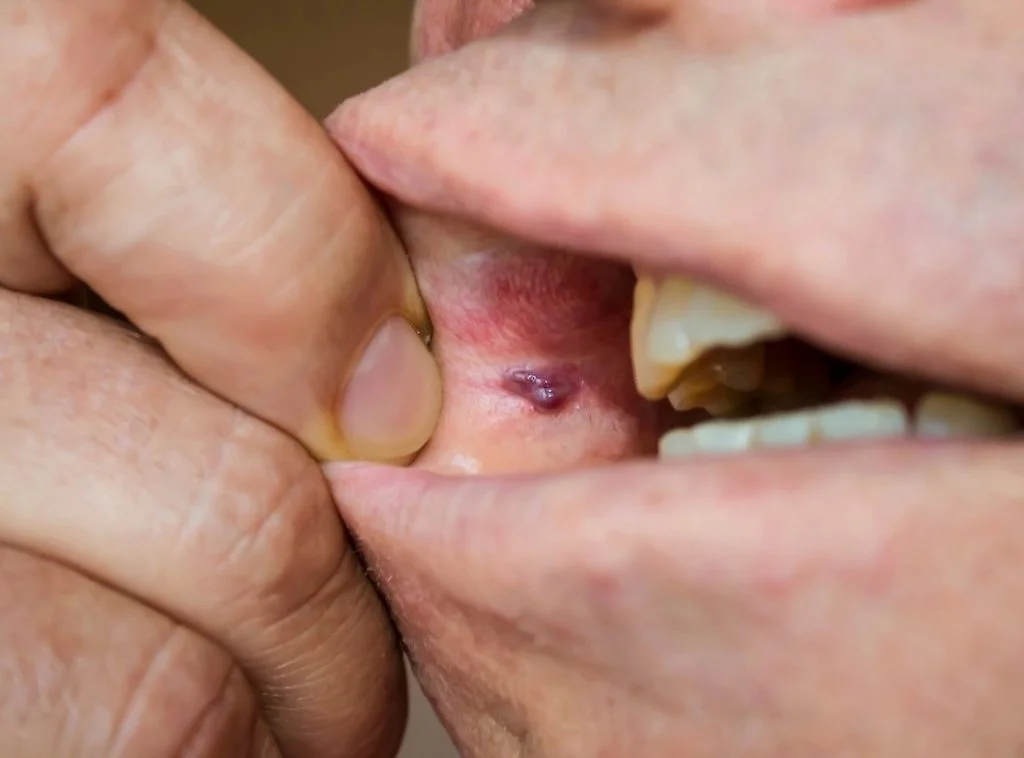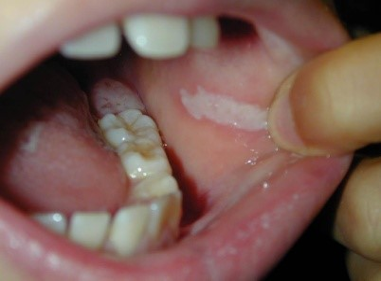Have you ever caught yourself biting the inside of your cheek and wondered why it keeps happening? It can be painful, annoying, and sometimes even embarrassing.
You’re not alone—many people experience this habit without fully understanding the reasons behind it. But what if knowing why you do this could help you stop? You’ll discover the surprising causes of cheek biting and simple ways to break free from this uncomfortable habit.
Keep reading—your mouth will thank you.

Credit: www.orisdentalcenter.ae
Common Causes Of Cheek Biting
Biting the inside of your cheek is a common problem. Many people do it without knowing why. Understanding the causes can help reduce this habit. It can also prevent pain and injury inside your mouth. Below are some usual reasons why cheek biting happens.
Accidental Biting
Accidental biting happens during eating or talking. Your teeth may catch the cheek by mistake. Chewing too fast or not paying attention leads to this. It causes sudden pain and small wounds. These bites usually heal quickly but can be painful.
Stress And Anxiety
Stress and anxiety make some people bite their cheeks often. It becomes a nervous habit or way to relieve tension. This biting can happen without realizing it. It may happen more during stressful times or before sleep. Managing stress can help reduce this cheek biting.
Misaligned Teeth
Misaligned or crooked teeth can cause frequent cheek biting. Teeth that do not fit well can trap the cheek tissue. This happens especially when chewing or talking. A dentist can check for alignment problems. Fixing the teeth can stop cheek biting from happening.
Cheek Injuries
Old injuries inside the cheek can cause biting. Scar tissue or swelling may make the cheek thicker. This makes it easier to bite accidentally. Also, injuries can make the cheek sensitive. Be gentle with the area to avoid more damage.

Credit: www.impressionsorthodontics.com
Effects Of Frequent Cheek Biting
Frequent cheek biting can cause several problems inside the mouth. It may seem small, but the effects can be painful and harmful. Understanding these effects helps you recognize why stopping this habit is important.
Pain And Discomfort
Biting the inside of your cheek often leads to pain. The skin inside your mouth is soft and sensitive. Constant biting irritates the tissue. This causes soreness that can last for days. Chewing food or talking may become uncomfortable.
Mouth Sores
Repeated biting can create open sores inside the mouth. These sores may look like small cuts or ulcers. They take time to heal. If you keep biting, sores can become worse. This slows down the healing process and causes more pain.
Infections
Open wounds inside the mouth can get infected. The mouth has many bacteria that can enter sores. Infections cause swelling and redness. They may also produce pus and bad smell. Infections need treatment to prevent serious problems.
Impact On Oral Health
Frequent cheek biting may affect overall oral health. It can cause chronic irritation and damage to mouth tissue. This might lead to thickened or white patches inside the cheek. These changes increase the risk of oral diseases. Good oral care is important to avoid long-term harm.
Simple Home Remedies To Stop Biting
Biting the inside of your cheek can be painful and annoying. Simple home remedies can help stop this habit. These methods soothe the area and prevent further damage. They also promote healing and comfort. Try these easy tips to protect your mouth and feel better fast.
Using Ice Or Cold Compress
Applying ice or a cold compress can reduce swelling and pain. Wrap ice in a cloth before placing it on your cheek. Use it for 10 to 15 minutes at a time. Cold helps numb the area and calm irritation. Repeat several times a day for relief.
Maintaining Oral Hygiene
Keep your mouth clean to avoid infections and speed healing. Brush gently twice daily with a soft toothbrush. Use an alcohol-free mouthwash to rinse after meals. Clean teeth and gums reduce irritation inside the mouth. Healthy hygiene supports fast recovery.
Applying Protective Waxes
Protective waxes create a barrier between your cheek and teeth. You can find dental wax at most drugstores. Place a small piece over sharp teeth or braces. This stops biting and lets your cheek heal. Replace the wax as needed for continued protection.
Stress Reduction Techniques
Stress often causes cheek biting without noticing. Practice deep breathing to calm your mind and body. Try meditation or gentle yoga to relax muscles. Taking breaks from stressful tasks can help too. Reducing stress lowers the chance of biting your cheek.

Credit: www.libertyvillagedentalcare.com
Dental Treatments And Solutions
Dental treatments help stop biting the inside of your cheek. These treatments fix the causes. They protect your mouth and make chewing safe again.
Orthodontic Adjustments
Teeth that do not line up properly cause cheek biting. Orthodontic treatments move teeth into the right place. Braces or aligners can fix bite problems. This reduces accidental cheek bites during eating or talking.
Mouthguards And Nightguards
Mouthguards create a barrier between teeth and cheeks. They stop the cheek from getting caught. Nightguards protect teeth and cheeks while sleeping. These guards are custom-made by dentists. They help people who clench or grind their teeth at night.
Professional Dental Care
Regular check-ups catch dental issues early. Dentists smooth sharp teeth edges that hurt your cheek. They treat mouth sores or infections that cause discomfort. Professional care keeps your mouth healthy and pain-free.
Tips To Prevent Cheek Biting Habit
Biting the inside of your cheek can cause pain and discomfort. Breaking this habit improves oral health and comfort. Simple steps help stop cheek biting and protect your mouth.
Here are some practical tips to prevent cheek biting and keep your mouth healthy.
Mindfulness Practices
Pay attention to your mouth and habits. Notice when you bite your cheek. Take deep breaths to reduce stress that may cause biting. Chew slowly and carefully to avoid accidental bites. Use reminders like notes or alarms to stay aware.
Regular Dental Checkups
Visit your dentist regularly to check your teeth alignment. Crooked teeth can cause accidental cheek biting. Dentists can suggest treatments or devices to protect your cheeks. Early dental care prevents long-term damage and discomfort.
Avoiding Chewy Foods
Chewy foods increase the chance of biting your cheek. Cut down on tough or sticky snacks. Choose soft foods that are easy to chew. This reduces mouth strain and lowers cheek biting risks.
Behavioral Therapy Options
Therapists can help change biting habits. They use techniques like habit reversal training. Therapy improves self-control and awareness. Seek professional help if cheek biting affects your daily life.
Frequently Asked Questions
Why Do People Bite The Inside Of Their Cheek Often?
Cheek biting can happen due to stress, anxiety, or accidental biting while chewing food.
Can Cheek Biting Cause Health Problems?
Yes, frequent biting can lead to sores, infections, and pain inside the mouth.
How Can I Stop Biting The Inside Of My Cheek?
Try to stay calm, chew slowly, and avoid hard or sharp foods.
Is Cheek Biting Linked To Any Medical Conditions?
It can be related to habits like bruxism or nervous disorders.
Does Cheek Biting Affect Speech Or Eating?
Pain from biting can make talking and chewing uncomfortable.
When Should I See A Doctor For Cheek Biting?
Seek help if bites cause lasting pain, swelling, or sores that won’t heal.
Conclusion
Biting the inside of your cheek can feel annoying and painful. It often happens by accident or from stress. Paying attention helps you stop the habit. Chewing slowly and relaxing your mouth can reduce bites. If the problem continues, talking to a doctor or dentist might help.
Taking care of your mouth helps it heal faster. Small changes make a big difference over time. Stay mindful and give your cheeks a break. Your mouth will thank you for the care.
Munia Akondh is a passionate skincare writer with a foundation in life sciences, which gives her a unique scientific perspective on beauty and skincare. As a digital marketer and skincare geek, Munia combines her love for product research, skin health, and marketing to create insightful content that resonates with beauty enthusiasts. Her expertise spans from understanding skincare ingredients to keeping up with the latest trends, making her a trusted voice in the industry.
